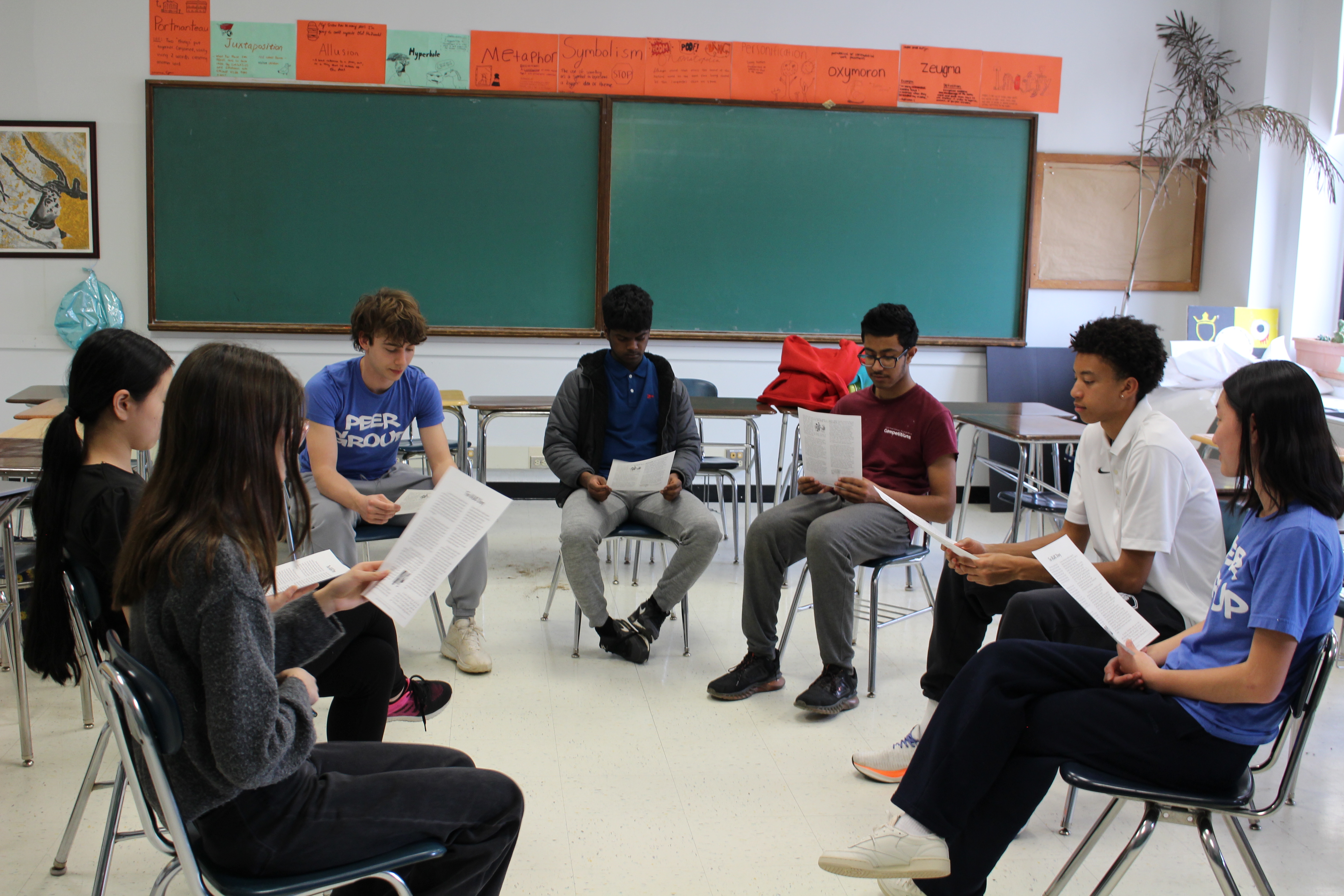Tower Investigates: Peer Group
March, 2025
Photo: Emily Kim
Peer Group leaders Tessa Thai ’25 and Ozan Koyluogu ’25 lead Tara Venkatesh ’28, Chloe Wu ’28, Rohan Balasubramanian ’28 , Pranav Shrivastava ’28, and Bram Reynolds ’28 in a reading of an I Am Lovable and Capable story.
As the final bell rings on a Tiger Day, Siddarth Chellapan ’28, along with the rest of PHS’s freshmen, heads to Peer Group to meet up with classmates and Peer Group leaders to discuss various social and school-related issues.
“It’s been beneficial for mental health because we get to learn more and get advice from upperclassmen,” said Chellapan. “It’s helped me understand how selecting courses work and understanding how the layout of the whole school system works.”
In the coming weeks, around 100 current PHS juniors will find out if they are one of the 63 applicants chosen to be Peer Group leaders next year. As part of the application, students have to answer written questions, attend interviews, and have teacher recommendations.
“It’s going to be my senior year next year, and I feel like I’ve done a lot of what the opportunities there are to offer here,” said Naomi Lygas ’26, a junior applying to be a Peer Group leader. “I just want to be able to provide my advice for the freshmen that obviously don’t have as much experience.”
If they are selected, the rising seniors will attend a short leadership retreat and enroll in a daily, year-long class on how to be a Peer Group leader.
“We’re looking for things like self-awareness, problem-solving ability, compassion and empathy, moral responsibility, [and] good active listening skills,” said Christian Gonzalez, a Peer Group advisor. “At the same time, in the written application, we’re looking for authenticity, commitment, again, self-awareness, and then leadership potential.”
The activities, called “outreaches,” vary depending on the week, but are usually centered around building community and adapting to the challenges of high school.
“It changes a lot from group to group, but with our freshmen, you usually have better outreaches with more serious topics, which seems like that wouldn’t actually happen, but it’s like they’re more engaged with the material. And it makes it worth being there,” said Ava Tabeart ’25, a Peer Group leader.
The goal for all activities is to develop a sense of community among freshmen. “I think the most important thing is that the freshmen feel like they are connected, like they have a space here at PHS, which, although a very welcoming place, is still a high school … and it can be hard to find a connection,” said Gonzalez.
Not only does Peer Group help freshmen adjust to a new school environment, it’s also a way for seniors to develop their leadership skills.
“I think a big part of it is actually to learn to be a leader of other people,” said Hayah Mian ’25, a current Peer Group leader. “You’re accommodating how [freshmen] work and how you work, and they’re kids, so it takes a couple of months to understand how they work and what works best.”
However, some freshmen remain critical of several aspects of the program.
“There’s a bunch of clubs that overlap with peer group, so I’m sad that I can’t go to those”, said John Patrick Aguilar ’28. “It could [also] be a little more energetic because most of the topics we approach with a sort of laziness. But I think that relies on [us] too, to bring more energy to the group.”
Mian and other peer group leaders are actively looking for ways that they can improve this program and make sure that PHS freshmen have the best possible experience.
“I think the way we talk about more serious topics [can be improved]. We talk about gender, sexuality, race and things, [which] I feel we are not completely prepared to dive deep into,” said Mian. “[Having] more preparation and more freedom with what you do with your students, as not all students are the same and learn differently, [would improve the program].